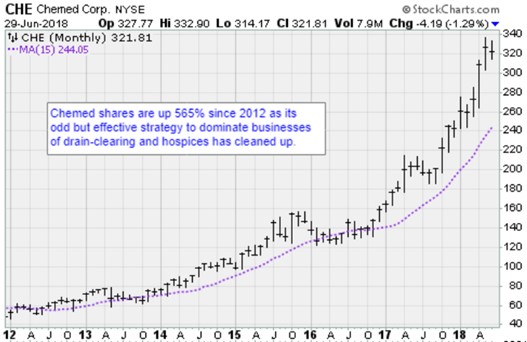Chemed is a holding company with a growth strategy all about consolidation. The goal is to acquire Roto-Rooter franchisee territories at reasonable valuations, while acquiring hospices. Chemed stock is ahead 32.7% in 2018, and 58% in the past year, writes Jon Markman.
Often, great businesses hide in plain sight. They are not flashy. They are utilitarian.
Since 1970, a little-known Cincinnati holding company has been quietly building empires in palliative care and sewage drain cleaning.
At first glance, these businesses seem to have very little in common. Well, other than what might, on the surface, seem to be limited investment promise.
They do have something else in common. And that’s Chemed Corp. (CHE), the $5.1 billion market cap company that owns them. Today, we’ll look at why its promise is bigger than meets the average investor’s eye.
You might not know the name Chemed. But you’re probably familiar with its Roto-Rooter division, which is helping it “clean up” on the profit front.
A Depression-era sensation
Roto-Rooter was founded in 1933 when inventor Samuel Blanc fashioned a sewer cleaning machine from old washing machine parts, and a length of 3/8-inch steel cable attached to a rotating C-shaped blade.
Blanc’s machine could cut through tree roots and other debris, unclogging sewer lines while negating costly excavation. It was a Depression-era sensation.
Today, the Roto-Rooter company is the largest provider of drain cleaning and plumbing repair services in the country. Its 600-strong network of company-owned stores and franchises serves 90% of the U.S. population, and 40% of Canada.
Vitas offers a newer take on the oldest industry
Vitas Healthcare began in 1978 as a non-profit. Hugh Westbrook, a Methodist minister, and Esther Colliflower, a registered nurse, felt the quality of care offered to patients at the end of their lives was lacking. They started a hospice organization, and later lobbied the federal government for Medicare funding.
Like Roto-Rooter, Vitas is also an industry leader. The Florida company has 16,550 patients, 44 hospice programs and operates in 14 states and the District of Columbia. It holds 7% of the market for hospice-care providers, making it the market-share leader.
Many hospice providers are still non-profit, and facilities can be started for as little as $300,000. Although barriers to entry are low, VITAS benefits from its ability to implement centralized, cost-effective systems at scale.
About 40% of Vitas patients receive care in its facilities, leaving the majority serviced by nurses in the field. In 2015, the company began working with Cisco Systems (CSCO) on an Internet of Everything strategy. The goal was to efficiently connect its 11,000 caregivers to patients for in-home care.
Today, that system is also the engine for a vast referral network that lets doctors quickly send referrals to Vitas’ facilities.
All of these factors helped Vitas’ sales grow 6.1% in 2017, to $1.15 billion.
Here’s what really connects these 2 companies
Roto-Rooter has been an iconic brand since the Great Depression. In 1954, its corporate jingle — “call Roto-Rooter, that’s the name, and away go troubles down the drain” — became synonymous with problem-solving. The branding is still alive today, helped by internet-era savvy.
A quick internet search for blocked drains, on a smartphone or computer invariably returns the nearby Roto-Rooter location, with a 24/7 phone number. The front page of the corporate website has how-to videos for emergency water shut-off, Roto-Rooter services and local testimonials.
The company has figured out how to remove all the friction of solving plumbing problems.
Through internet marketing and an aggressive strategy that encourages local tradespeople to pursue Roto-Rooter franchises, the company can serve the vast majority of key North American markets.
A certified plumber from a respected company is just a few swipes and taps away. And the financial results speak to the success of this strategy.
Sales are going in the right direction — up. In 2013, the company did $368 million in sales. By 2017, that number had risen to $518 million, with 19.3% operating margins.
Business is good. And it is about to get better for Chemed …

CEO Kevin McNamara is very clear about the next steps in the Chemed growth strategy. It’s all about consolidation. The goal is to acquire Roto-Rooter franchisee territories at reasonable valuations, while continuing to acquire hospices.
Both Roto-Rooter and Vitas are dominant players in markets largely populated by mom-and-pop regional businesses. There is plenty of opportunity to build market share.
McNamara is looking to buy Roto-Rooter stores with $175 million to $200 million in annual sales. And he is willing to pay 5x earnings before taxes and depreciation. That would be a big payout for franchisees. It would also involve minimal capital expenditure from Chemed shareholders.
Chemed stock is ahead 32.7% in 2018, and 58% during the past year. The average 10-year rate of return is 24.5%.
All this growth means the stock trades at 55x trailing earnings, and 2.4X sales. While that is not cheap, this is the dominant leader and its market capitalization is still only $5.1 billion.
Best wishes,
Jon D. Markman
Subscribe to Jon Markman’s Power Elite newsletter here
Subscribe to Jon Markman’s Tech Trend Trader here
Subscribe to Jon Markman’s Strategic Advantage here











